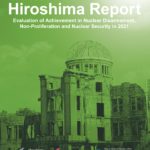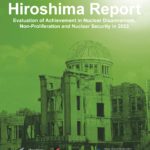Hiroshima Report 20249. Australia ■Non-Nuclear-Weapon State
| Nuclear Disarmament | 23.5 Points | Full Points 48 | 49 % |
| Change compared to the Hiroshima Report 2023 1 | |||
| Australia advocates the “progressive approach” toward a world without nuclear weapons through incremental, practical measures. While Australia has not signed the TPNW, Australia participated as an observer in the Second Meeting of the States Parties to the TPNW (2MSP) following the previous meeting. Australia has increased its reliance on extended (nuclear) deterrence. Australia participated in the IPNDV. It has actively engaged in the promotion for entry into force of the CTBT. The country co-hosted a Commemorative High-Level Event on an FMCT. It has proactively engaged in cooperation with civil society and gender mainstreaming. | |||
| Nuclear Non-Proliferation | 56 Points | Full Points 61 | 91.8 % |
| Change compared to the Hiroshima Report 2023 0 | |||
| Australia is also a state party to the South Pacific Nuclear-Free Zone Treaty. It acceded to the IAEA Additional Protocol, and has applied the integrated safeguards. The Australia-India Nuclear Cooperation Agreement was adopted in 2015, and Australia exports uranium. Australia, the U.K. and the U.S. decided to work together to introduce nuclear submarines to Australia. It continues consultations with the IAEA regarding how to implement IAEA safeguards for their nuclear fuel. It has implemented export controls appropriately. | |||
| Nuclear Security | 28 Points | Full Points 38 | 73.7 % |
| Change compared to the Hiroshima Report 2023 0 | |||
| Australia has ratified all nuclear security-related conventions and established a national implementation system for A/CPPNM. It hosted an IPPAS mission in 2017. Australia is one of the few countries that have made some of the IPPAS mission reports publicly available. It hasn’t make contributions to NSF recent years. Australia participates in almost all INFCIRC initiatives. Australia has been ahead in cybersecurity measures. | |||






